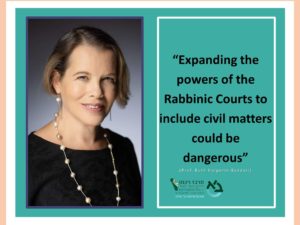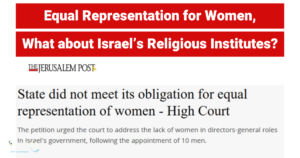“Expanding the powers of the rabbinic courts to include civil matters could be dangerous,” says Prof. Ruth Halperin-Kaddari, Founding Head of the Rackman Center, in an interview with Keren Neubach on her radio program, ‘Seder Yom’.
Imagine if employers started adding a clause to employment contracts saying that the employee agrees that any labor dispute will be heard by the Rabbinical Court (and not by the Labor Court).
First, in such a situation, there cannot exactly be free and fair ‘consent’. An employee who needs employment and depends on a salary will be afraid to oppose such a clause for fear that it could lead to losing the job. In addition, if there is, indeed, a labor dispute and they are forced to come to a hearing, it is important to remember that the Rabbinical Courts are not bound by civil law. Experience shows that in matters such as withholding wages, failure to contribute to a pension fund or dismissal during pregnancy, these courts are not bound by the laws protecting Israeli workers.
“This is dangerous in other in other contexts as well, not only the employee-employer relationship. It is not possible to reach agreements when there is a power gap between spouses. In a divorce, the husband has tremendous power to extort concessions from the wife before receiving the ‘Gett’. A woman’s consent to stand before the law of the Torah can never be [true] consent”, explains Prof. Halperin-Kaddari.







